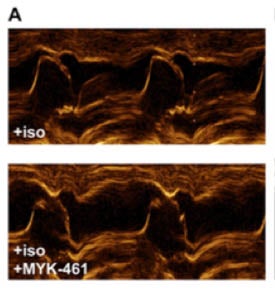A new heart disease treatment may give cats more time to nap, pounce and knock that glass of water off the counter. The novel drug also has positive implications for their human companions.
“This is an exciting discovery for both animals and humans — an excellent representation of the One Health concept in action,” said Associate Professor Joshua Stern, a board-certified cardiologist with the UC Davis School of Veterinary Medicine’s veterinary hospital.
A disease affecting multiple species
The novel drug, MYK-461, proved effective in altering feline heart function in a study of five cats with a naturally occurring form of inherited hypertrophic cardiomyopathy (HCM), a currently incurable disease that also affects people.
HCM is the most common form of feline heart disease and results in thickening of the walls of the heart ventricles and altering of heart function. It frequently leads to fatal consequences. Cats with this disease may suffer blood clot formation, congestive heart failure and sudden death. In humans, HCM is a frequent cause of sudden cardiac death that can even afflict seemingly healthy young athletes. HCM affects approximately one in 500 people and a startling one in seven cats, according to recent reports.
Yet current treatment for cats with HCM mitigates only the symptoms, not the causes. There is no preventative therapy for HCM that is shown to change the course of disease.
“There has been little to no progress in advancing the treatment of HCM in humans or animals for many years,” Stern said. “This study brings new hope for cats and people.”

Implications for daily life
Specifically, in the study, treatment with MYK-461 eliminated obstruction in the left ventricle in five cats with HCM. This means that the novel drug may help keep excessive growth of the heart’s walls at bay — without surgery or interventional procedures — so the heart can pump and blood can flow easily and efficiently. The hope is that because of improved heart function, cats with HCM may enjoy a longer lifespan and high quality of life during that time.
More testing for widespread use
Knowing that the drug is viable for use in cats from this “proof of concept” study makes a clinical trial possible in the near future. If conducted, the trial could determine if MYK-461 or a related compound has the potential to become the accepted protocol for care of cats with HCM. It also promises advances in HCM treatment for humans, making Stern's research a great example of comparative medicine. Stern said his work, by the multidisciplinary team of experts in veterinary and human cardiology, genetics, pharmacology and more, “makes continued efforts to bring this drug to market for humans more feasible. At the same time, it offers new hope for veterinary patients.”
Rob Warren writes for the UC Davis School of Veterinary Medicine Dean's Office.